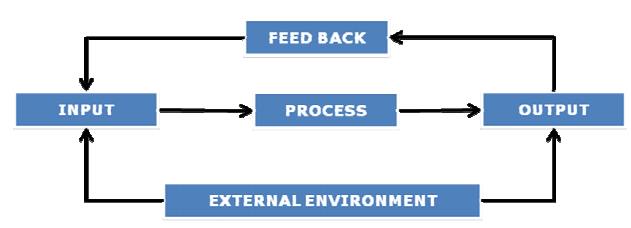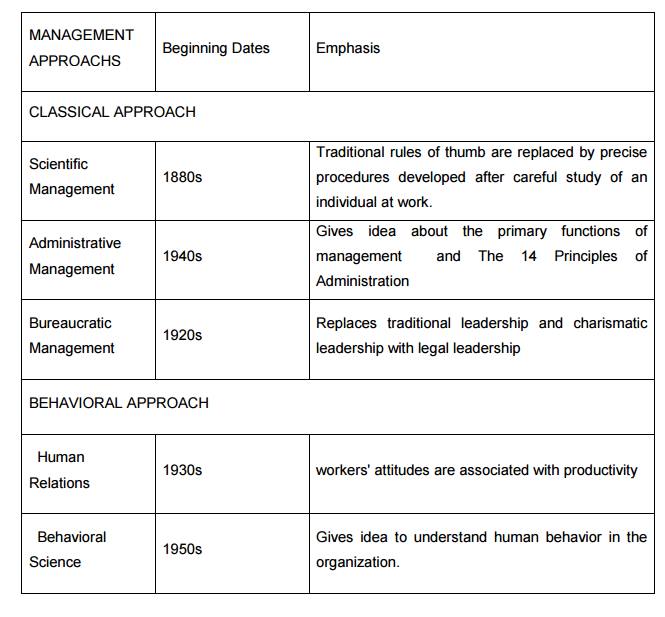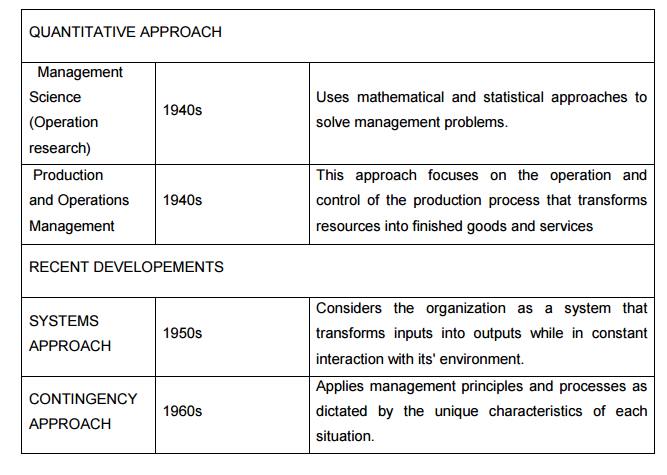Chapter: Principles of Management
Evolution of Management Thought
EVOLUTION OF MANAGEMENT THOUGHT
The practice of management is as old as human civilization. The ancient
civilizations of Egypt (the great pyramids), Greece (leadership and war tactics
of Alexander the great) and Rome displayed the marvelous results of good
management practices.
The origin of management as a discipline was developed in the late 19th
century. Over time, management thinkers have sought ways to organize and
classify the voluminous information about management that has been collected
and disseminated. These attempts at classification have resulted in the
identification of management approaches. The approaches of management are
theoretical frameworks for the study of management. Each of the approaches of
management are based on somewhat different assumptions about human beings and
the organizations for which they work.
The different approaches of management are a) Classical approach,
Behavioral
approach,
Quantitative approach,
Systems approach,
Contingency approach.
The formal
study of management is largely a twentieth-century phenomenon, and to some
degree the relatively large number of management approaches reflects a lack of
consensus among management scholars about basic questions of theory and
practice.
a) THE CLASSICAL APPROACH:
The
classical approach is the oldest formal approach of management thought. Its
roots pre-date the twentieth century. The classical approach of thought
generally concerns ways to manage work and organizations more efficiently.
Three areas of study that can be grouped under the classical approach are
scientific management, administrative management, and bureaucratic management.
(i)
Scientific Management.
Frederick Winslow Taylor is known as the father of scientific
management. Scientific management (also called Taylorism or the Taylor system)
is a theory of management that analyzes and synthesizes workflows, with the
objective of improving labor productivity. In other words, Traditional rules of
thumb are replaced by precise procedures developed after careful study of an
individual at work.
(ii)
Administrative Management.
Administrative management focuses on the management process and
principles of management. In contrast to scientific management, which deals
largely with jobs and work at the individual level of analysis, administrative
management provides a more general theory of management. Henri Fayol is the
major contributor to this approach of management thought.
(iii)
Bureaucratic Management.
Bureaucratic management focuses on the ideal form of organization. Max
Weber was the major contributor to bureaucratic management. Based on
observation, Weber concluded that many early organizations were inefficiently
managed, with decisions based on personal relationships and loyalty. He
proposed that a form of organization, called a bureaucracy, characterized by
division of labor, hierarchy, formalized rules, impersonality, and the
selection and promotion of employees based on ability, would lead to more
efficient management. Weber also contended that managers' authority in an
organization should be based not on tradition or charisma but on the position
held by managers in the organizational hierarchy.
b) THE BEHAVIORAL APPROACH:
The behavioral approach of management thought developed, in part,
because of perceived weaknesses in the assumptions of the classical approach.
The classical approach emphasized efficiency, process, and principles. Some
felt that this emphasis disregarded important aspects of organizational life,
particularly as it related to human behavior. Thus, the behavioral approach
focused on trying to understand the factors that affect human behavior at work.
(i) Human
Relations.
The Hawthorne Experiments began in 1924 and continued through the early
1930s. A variety of researchers participated in the studies, including Elton
Mayo. One of the major conclusions of the Hawthorne studies was that workers'
attitudes are associated with productivity. Another was that the workplace is a
social system and informal group influence could exert a powerful effect on
individual behavior. A third was that the style of supervision is an important
factor in increasing workers' job satisfaction.
(ii)
Behavioral Science.
Behavioral science and the study of organizational behavior emerged in
the 1950s and 1960s. The behavioral science approach was a natural progression
of the human relations movement. It focused on applying conceptual and
analytical tools to the problem of understanding and predicting behavior in the
workplace.
The behavioral science approach has contributed to the study of
management through its focus on personality, attitudes, values, motivation,
group behavior, leadership, communication, and conflict, among other issues.
c) THE QUANTITATIVE APPROACH:
The quantitative approach focuses on improving decision making via the
application of quantitative techniques. Its roots can be traced back to
scientific management.
(i)
Management Science (Operations Research)
Management science (also called operations research) uses mathematical
and statistical approaches to solve management problems. It developed during
World War II as strategists tried to apply scientific knowledge and methods to
the complex problems of war. Industry began to apply management science after
the war. The advent of the computer made many management science tools and
concepts more practical for industry
(ii)
Production And Operations Management.
This approach focuses on the operation and control of the production
process that transforms resources into finished goods and services. It has its
roots in scientific management but became an identifiable area of management
study after World War II. It uses many of the tools of management science.
Operations management emphasizes productivity and quality of both
manufacturing and service organizations. W. Edwards Deming exerted a tremendous
influence in shaping modern ideas about improving productivity and quality.
Major areas of study within operations management include capacity planning,
facilities location, facilities layout, materials requirement planning,
scheduling, purchasing and inventory control, quality control, computer
integrated manufacturing, just-in-time inventory systems, and flexible
manufacturing systems.
d) SYSTEMS APPROACH:
The simplified block diagram of the systems
approach is given below.

The
systems approach focuses on understanding the organization as an open system
that transforms inputs into outputs. The systems approach began to have a
strong impact on management thought in the 1960s as a way of thinking about
managing techniques that would allow managers to relate different specialties
and parts of the company to one another, as well as to external environmental
factors. The systems approach focuses on the organization as a whole, its
interaction with the environment, and its need to achieve equilibrium
e)
CONTINGENCY APPROACH:
The
contingency approach focuses on applying management principles and processes as
dictated by the unique characteristics of each situation. It emphasizes that
there is no one best way to manage and that it depends on various situational
factors, such as the external environment, technology, organizational
characteristics, characteristics of the manager, and characteristics of the
subordinates. Contingency theorists often implicitly or explicitly criticize
the classical approach for its emphasis on the universality of management
principles; however, most classical writers recognized the need to consider
aspects of the situation when applying management principles.


CONTRIBUTION OF FAYOL AND TAYLOR
F.W. Taylor and Henry
Fayol are generally regarded as the founders of scientific management and
administrative management and both provided the bases for science and art of
management.
Taylor's
Scientific Management
Frederick
Winslow Taylor well-known as the founder of scientific management was the first
to recognize and emphasis the need for adopting a scientific approach to the
task of managing an enterprise. He tried to diagnose the causes of low
efficiency in industry and came to the conclusion that much of waste and
inefficiency is due to the lack of order and system in the methods of
management. He found that the management was usually ignorant of the amount of
work that could be done by a worker in a day as also the best method of doing
the job. As a result, it remained largely at the mercy of the workers who
deliberately shirked work. He therefore, suggested that those responsible for
management should adopt a scientific approach in their work, and make use of
"scientific method" for achieving higher efficiency. The scientific
method consists essentially of
Observation
Measurement
Experimentation and
Inference.
He
advocated a thorough planning of the job by the management and emphasized the
necessity of perfect understanding and co-operation between the management and
the workers both for the enlargement of profits and the use of scientific
investigation and knowledge in industrial work. He summed up his approach in
these words:
Science, not rule of
thumb
Harmony, not discord
Co-operation, not
individualism
Maximum output, in
place of restricted output
The development of
each man to his greatest efficiency and prosperity.
Elements of Scientific Management: The techniques which Taylor regarded as its
essential elements or features may
be classified as under:
Scientific Task and
Rate-setting, work improvement, etc.
Planning the Task.
Vocational Selection
and Training
Standardization (of
working conditions, material equipment etc.)
Specialization
Mental Revolution.
1. Scientific Task and Rate-Setting (work
study): Work study may be defined as the systematic, objective and critical
examination of all the factors governing the operational efficiency of any
specified activity in order to effect improvement.
Work study
includes.
Methods
Study: The management should
try to ensure that the plant is laid out in the best manner and is equipped with the best tools and machinery. The
possibilities of eliminating or combining certain operations may be studied.
Motion Study: It is a study of the movement, of an operator (or even of a machine) in
performing an operation with the purpose of eliminating useless motions.
Time Study (work measurement): The basic purpose of time study is to determine
the proper time for performing the
operation. Such study may be conducted after the motion study. Both time study
and motion study help in determining the best method of doing a job and the
standard time allowed for it.
Fatigue Study: If, a standard task is set without providing for
measures to eliminate fatigue, it
may either be beyond the workers or the workers may over strain themselves to
attain it. It is necessary, therefore, to regulate the working hours and
provide for rest pauses at scientifically determined intervals.
Rate-setting: Taylor recommended the differential piece wage system, under which
workers performing the standard task
within prescribed time are paid a much higher rate per unit than inefficient
workers who are not able to come up to the standard set.
Planning the Task: Having set the task which an average worker must
strive to perform to get wages at
the higher piece-rate, necessary steps have to be taken to plan the production
thoroughly so that there is no bottlenecks and the work goes on systematically.
Selection and Training: Scientific Management requires a radical change
in the methods and procedures of
selecting workers. It is therefore necessary to entrust the task of selection
to a central personnel department. The procedure of selection will also have to
be systematised. Proper attention has also to be devoted to the training of the
workers in the correct methods of work.
Standardization: Standardization may be introduced in respect of
the following.
Tools and equipment: By standardization is meant the process of
bringing about uniformity. The
management must select and store standard tools and implements which will be
nearly the best or the best of their kind.
Speed: There is usually an optimum speed for every machine. If it is exceeded,
it is likely to result in damage to
machinery.
Conditions of Work: To attain standard performance, the maintenance
of standard conditions of
ventilation, heating, cooling, humidity, floor space, safety etc., is very
essential.
Materials: The efficiency of a worker depends on the quality of materials and the
method of handling materials.
Specialization: Scientific management will not be complete
without the introduction of specialization.
Under this plan, the two functions of 'planning' and 'doing' are separated in
the organization of the plant. The `functional foremen' are specialists who
join their heads to give thought to the planning of the performance of
operations in the workshop. Taylor suggested eight functional foremen under his
scheme of functional foremanship.
The Route Clerk: To lay down the sequence of operations and
instruct the workers concerned about
it.
The
Instruction Card Clerk: To
prepare detailed instructions regarding different aspects of work.
The Time and Cost Clerk: To send all information relating to their pay to
the workers and to secure proper
returns of work from them.
The Shop Disciplinarian: To deal with cases of breach of discipline and
absenteeism.
The Gang Boss: To assemble and set up tools and machines and to
teach the workers to make all their
personal motions in the quickest and best way.
The Speed Boss: To ensure that machines are run at their best
speeds and proper tools are used by
the workers.
The Repair Boss: To ensure that each worker keeps his machine in
good order and maintains cleanliness
around him and his machines.
The
Inspector: To show to
the worker how to do the work.
Mental Revolution: At present, industry is divided into two groups
– management and labour. The major
problem between these two groups is the division of surplus. The management
wants the maximum possible share of the surplus as profit; the workers want, as
large share in the form of wages. Taylor has in mind the enormous gain that
arises from higher productivity. Such gains can be shared both by the
management and workers in the form of increased profits and increased wages.
Henry Fayol's 14 Principles of Management:
The
principles of management are given below:
Division of work: Division of work or specialization alone can
give maximum productivity and efficiency.
Both technical and managerial activities can be performed in the best manner
only through division of labour and specialization.
Authority and Responsibility: The right to give order is called authority. The
obligation to accomplish is called
responsibility. Authority and Responsibility are the two sides of the
management coin. They exist together. They are complementary and mutually
interdependent.
Discipline: The objectives, rules and regulations, the policies and procedures must
be honoured by each member of an
organization. There must be clear and fair agreement on the rules and
objectives, on the policies and procedures. There must be penalties
(punishment) for non-obedience or indiscipline. No organization can work
smoothly without discipline - preferably voluntary discipline.
Unity of Command: In order to avoid any possible confusion and
conflict, each member of an
organization must received orders and instructions only from one superior
(boss).
Unity of Direction: All members of an organization must work
together to accomplish common
objectives.
Emphasis on Subordination of Personal Interest
to General or Common Interest: This is also called principle
of co-operation. Each shall work for all and all for each. General or common
interest must be supreme in any joint enterprise.
Remuneration: Fair pay with non-financial rewards can act as the best incentive or
motivator for good performance.
Exploitation of employees in any manner must be eliminated. Sound scheme of
remuneration includes adequate financial and nonfinancial incentives.
Centralization: There must be a good balance between
centralization and decentralization of authority
and power. Extreme centralization and decentralization must be avoided.
Scalar Chain: The unity of command brings about a chain or hierarchy of command
linking all members of the
organization from the top to the bottom. Scalar denotes steps.
Order: Fayol suggested that there is a place for everything. Order or system
alone can create a sound
organization and efficient management.
Equity: An organization consists of a group of people involved in joint effort.
Hence, equity (i.e., justice) must
be there. Without equity, we cannot have sustained and adequate joint collaboration.
Stability of Tenure: A person needs time to adjust himself with the
new work and demonstrate efficiency
in due course. Hence, employees and managers must have job security. Security
of income and employment is a pre-requisite of sound organization and
management.
Esprit of Co-operation: Esprit de corps is the foundation of a sound
organization. Union is strength. But
unity demands co-operation. Pride, loyalty and sense of belonging are
responsible for good performance.
Initiative: Creative thinking and capacity to take initiative can give us sound
managerial planning and execution of
predetermined plans.
Related Topics